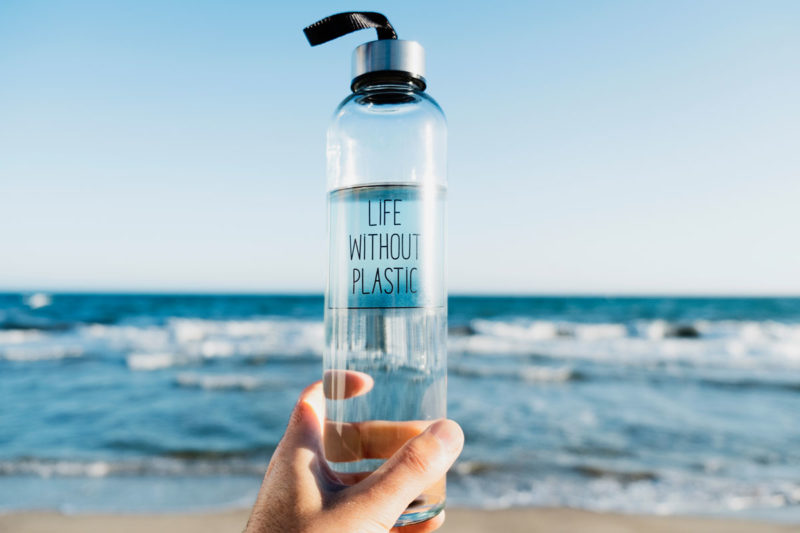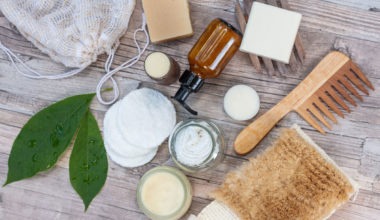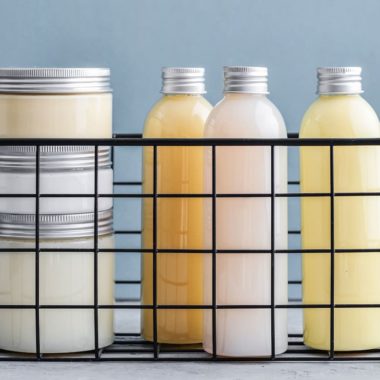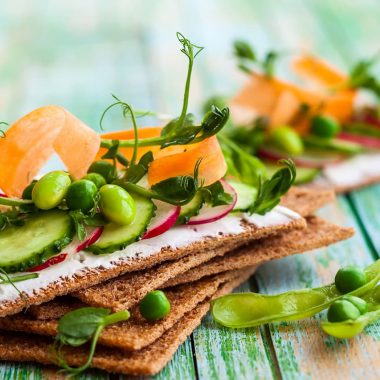Plastic is a considerable and most importantly persistent source of pollution. It never disappears, but breaks down into micro-plastics that pervade the sea, soil and living organisms… Like ourselves! It’s time to embrace basic anti-plastic habits in our daily lives.
According to a WWF stufy, we each ingest around 5g of plastic per week, or a credit card’s worth! Using a plastic cutting board, eating seafood that has absorbed plastic through plankton or via food packaging… The risk here is of an ecological and also a public health nature. Here’s what you can do about it:
Anti-plastic kitchen habits

- Cook with fresh ingredients and store food in glass storage containers. Avoid mass-produced ready meals that come in plastic trays for heating up in the microwave, whose component substances can leech into the food.
- Avoid standard sponges. Made from soft plastic, they break down into crumbs that end up in wastewater. Switch to tawashis (Japanese sponges made from recycled fabric) or brushes with wooden handles.
- Use Kraft paper or cardboard bags instead of plastic bin liners. The latter ending up either incinerated (giving off toxic fumes), or in landfill (breaking down in the soil). So avoiding them is a matter of urgency.
- Do without cling film, whose short lifespan makes it not worth using. Consider “bee wraps”, wax-coated fabric sheets that are re-usable and natural!
- Don’t buy drinks that come in plastic bottles, especially carbonated drinks, any longer – it’s bad for the planet and your health! Unless medical grounds dictate otherwise, avoid mineral water that comes in plastic bottles. Instead, favour glass bottles, a tap-mounted filter or a charcoal filter made from binchōtan or similar, that you can place in a glass jug of water to filter it naturally.
Anti-plastic bathroom habits

- In France, cotton buds with plastic stems have in theory been banned since January 2020. Until this takes effect widely, opt for a re-useable ear cleaner or cotton bud, or a cardboard or bamboo taper.
- Switch to solid shampoo and bars of soap instead of liquid shampoos and shower gels. That’s hundreds of plastic bottles that won’t be thrown away, or even produced in the first place! Plus, some solid cleansing products smell divine!
- Like toothbrushes, toothpaste tubes never get recycled… For eco-friendly toothbrushing, embrace wooden-handled toothbrushes and toothpaste that comes in a metal tube, or a solid version!
- Instead of tampons with “compact” plastic applicators, and sanitary towels made from synthetic fibres, (and thus plastics), favour washable period underwear or cups that can be re-used forever!
- Out with cleansing wipes. Made from synthetic fibres, they are polluting. For you or your baby, go for washable fabric wipes!
Anti-plastic office habits

- Kit yourself out with a mug so that you never need to take a plastic cup from the coffee machine ever again! Even though they are made from cardboard, they are often coated with a plastic film that makes them non-recyclable… That also applies to “stirrers”, for which the good old teaspoon makes a brilliant replacement!
- If you usually pick up a takeaway lunch, at a delicatessen for example, take your own containers along and cutlery and decline the plastic bag offered!
Anti-plastic habits when you’re outside
- Don’t ever throw your cigarette butt on the ground. A single cigarette filter, made from cellulose acetate, a plastic fibre, takes more than 15 years to disintegrate and can pollute 500 litres of water. Throwing one down in the street is allowing it to end up in a river or the sea someday, through unfiltered river water.
- At the bar, ask for your Mojito without a plastic straw! In France , they are expected to be banned soon, but there are still some in circulation.
In France , since 1 January 2021, disposable plastic straws, cutlery and stirrers have been banned from sale. However, they may still be handed out until supplies run out. To let manufacturing companies adjust, the government has set a target of phasing out disposable plastic items… By 20 years from now!
But there’s no need to wait for the legislation to start doing without, today even. Head for shops selling loose items, re-useable alternatives and sustainable materials
For further details: J’arrête le plastique, Anne Thoumieux, published by Editions Leduc







